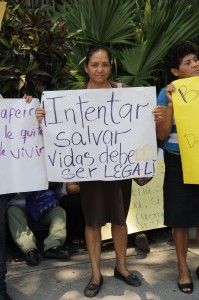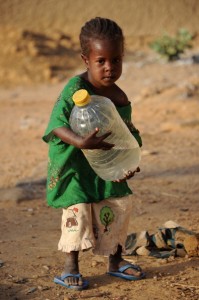
Women’s human rights activists gather in El Salvador to demand Beatriz is granted the life-saving treatment she needs (Photo Credit: Amnesty International).
As you’re reading this, the Salvadoran authorities are STILL biding their time discussing the merits of Beatriz’s case, the young mother we posted about earlier this month. While she’s in the hospital experiencing early stage kidney failure, the authorities are holding the key to her life that is quickly fading.
We’ve promised updates on this case. Unfortunately, we know that Beatriz has been subjected to another week of cruel, inhumane and degrading treatment, and have no news regarding action by the authorities to save her life – in accordance with her wishes, and the recommendation of the health professionals responsible for her care.
Imagine you are in a hospital. You have lupus and you are experiencing kidney complications as a result. You have a one-year old son at home who was delivered by cesarean section weeks early because of pregnancy-related health complications. You’re pregnant again, and have been diagnosed as high-risk.
You found out after three sonograms your fetus is anencephalic, meaning that a portion of the fetus’s brain – consisting mainly of the cerebral hemispheres including the neo-cortex – doesn’t exist. With very few exceptions, fetuses with anencephaly do not make it to term and none survive infancy.

 Before you keep reading, let’s be clear: this blog is about the universal human right to the highest attainable standard of health, the package of services it takes to be well—and the ability to afford it. It’s also about the implications of the Susan G. Komen Foundation’s decision to
Before you keep reading, let’s be clear: this blog is about the universal human right to the highest attainable standard of health, the package of services it takes to be well—and the ability to afford it. It’s also about the implications of the Susan G. Komen Foundation’s decision to 

 It’s been a little over a year since the government of Sierra Leone launched its
It’s been a little over a year since the government of Sierra Leone launched its 

 Most maternal deaths are entirely preventable. Yet, while the world is making progress in fighting maternal mortality, far too many women are still losing their lives.
Most maternal deaths are entirely preventable. Yet, while the world is making progress in fighting maternal mortality, far too many women are still losing their lives.